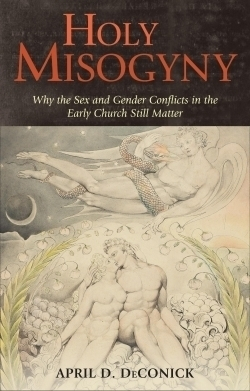Holy Misogyny
Why the Sex and Gender Conflicts in the Early Church Still Matter
“Orthodox” Christian doctrine presents God as an all-male, three-in-one figure who creates and gives birth with no need of help from the feminine. To anyone whose mind is not fettered by “belief,” the proposition seems quite curious; author April D. DeConick’s five-year-old son was moved to ask: ‘What happened to the lady God?’”
DeConick, a specialist in early Christian history and theology, non-canonical gospels and Gnostic and mystical traditions, and the author of many books on these topics, is the Isla Carroll and Percy E. Turner Professor of Biblical Studies at Rice University in Houston. Holy Misogyny traces how the record of women’s lives and activities in the early church was intentionally erased and replaced with misogynist narratives which were declared to be the “word of God.” DeConick calls the loss of the female aspect of God “one of the great tragedies of Christianity.” The imbalance has also warped human perception and understanding, likely giving rise to a world marked by war and aggression and lacking in concern for the weak and dispossessed.
What DeConick finds most dismaying is the fact that the false, misogynist narrative was made sacred, institutionalized, taught as truth, and used for more than 2,000 years to control and subject half of the population to the other half, affecting the lives of men and women at the altar, in the bedroom, and in the boardroom.
DeConick’s research traces the root of the problem beyond the usual interpretations of scripture, theology, and the social structures of the times to something deeper and much more perverse: the idea that the female body is “naturally deficient,” subhuman, and no more than a field to be plowed and seeded by a man in an act of pleasureless sex likely to result in pregnancy, painful childbirth, and possibly even death. Moreover, women were taught that God had ordained that they suffer as punishment for Eve’s role in bringing sin and death into the world through her act of disobedience in the Garden.
But, according to DeConick, “the real serpent in the Garden is misogyny.” “As long as the Bible’s devaluation of the female body … is viewed as sacred, no reasonable argument can dislodge it,” she says. “As long as the Bible’s story of the subjugation of woman is viewed as God’s deserved decree laid upon all women for all time, there can be no liberation.”
DeConick’s book began with a question asked by her son. It ends with a question directed to everyone: “How much longer must women suffer the dreadful and damning consequences of the ancient male imagination, which valorized the male body while it vulgarized the female, because the Bible tells us so?”
Reviewed by
Kristine Morris
Disclosure: This article is not an endorsement, but a review. The publisher of this book provided free copies of the book to have their book reviewed by a professional reviewer. No fee was paid by the publisher for this review. Foreword Reviews only recommends books that we love. Foreword Magazine, Inc. is disclosing this in accordance with the Federal Trade Commission’s 16 CFR, Part 255.

